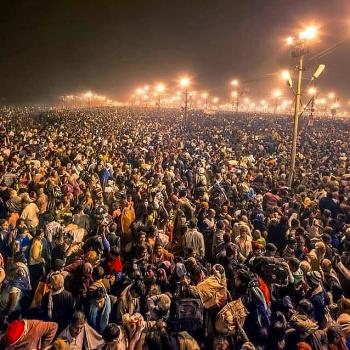I throw my hat in the ring with Flannery O'Connor, with Thomas Merton, with Walker Percy, with Lee Smith, with Anne Lamott, all those writers who let their Christian faith into their art by telling the truest, most beautiful story possible, talking about the world as it is and as they hope it might be. Christian art like that can have a much more transformative role in society first because it may get experienced by more people—have you ever seen a non-Christian walking into a Christian bookstore and picking something off the shelf?—and second, because it is true to reality as I understand it. Good people, even faithful people, get hurt; evil people prosper. Garbage dumps grow; forests fall. But by telling stories in which we insist that grace is always possible, that beauty may lurk in unsuspected places, we are also telling deep theological truths.
Your formulation of the Christian commission is "helping God redeem the world, so that everyone knows—so that people can see with their own eyes—that they are meant to be a part of God's family as well." Why do you think God enlists the help of man?
Well, certainly not because God needs man, at least not in the classic formulations of who God is. But God offers humankind the opportunity to participate in the great work of recovery because that is what the universe is for; it's our deepest purpose, whether or not we know it. If we are made in the image of God, then why wouldn't we do, on our own small scale, the sorts of things God is doing, particularly as they've been made known to us in the teachings and miracles of Jesus? As I said earlier, the gospels show us Jesus calling his disciples into lives that imitate his, and I don't think that mandate has changed. If we are disciples of Jesus, we are supposed to do what he did. And when we do, we are making God's love manifest is such a way that other people will note it and will want to be a part of it.
You cite the Celtic tradition of recognizing and valuing the manifest beauty of God in creation as one of the four major Christian traditions and one that has only really regained a wider following in the past two hundred years. Where have you seen the resurrection of this tradition take place?
I think the nexus of the Celtic resurgence has taken place where it started, on the island of Iona and with the community that has formed around the tradition there and spread around the world. I see it most obviously in the life and work of my friend J. Philip Newell, who, with his wife Ali, was Warden of Iona early in his vocational life. What Philip has done so well is not only popularize the gifts of Celtic Christianity that began to be rediscovered in the 19th century (by people like Alexander Carmichael, who collected poems and prayers and published them in his great work Carmina Gadelica), but add new gifts with the Celtic liturgies and prayers he has written and given to the world. I use a set of Philip's morning and evening prayers in my own devotionals daily, and use a revised morning and evening prayer of his composition as liturgy when I do retreats or conferences.
Prayer is theological; the way we approach God says something about who we believe God to be. And the God I see revealed in these prayers, and in the Celtic tradition in general, is simultaneously the Creator God who shaped the cosmos, and the Companion who walks with me on my daily path. Plus they're beautiful, and I need more beauty in my life.
I love one of the ending statements in The Other Jesus: "But if we live with love and compassion, all will see the connection between Jesus, the founder of our faith, and his followers—a connection that now seems to elude them." Do you see the church going more in this direction of "living with love and compassion"? In what direction do you see public opinion of the church heading?
I don't, in general, see the Church behaving with more love and compassion, although I certainly see individual churches doing so. As I note in the book, Christianity has increasingly high negatives among young Americans who don't perceive the Church acting in this way, but rather in its polar opposite. But I am hopeful that evangelicals who love God and express that love by drilling water wells in the Third World, or by rescuing women and children from slavery of whatever sort, or who love this planet that God has given us enough to treat it with respect can join "The Other Christians" Diana Butler Bass writes about. Augustine wrote that our two-fold commandment is to love God and to love each other, and that we express our love for God most powerfully through our love for each other. Wherever evangelical, Catholic, Orthodox, Mainline, or Emerging Christians are taking up that two-fold commandment in earnest, I believe they are both restoring the reputation of Christianity and living in a truly Christian fashion.




